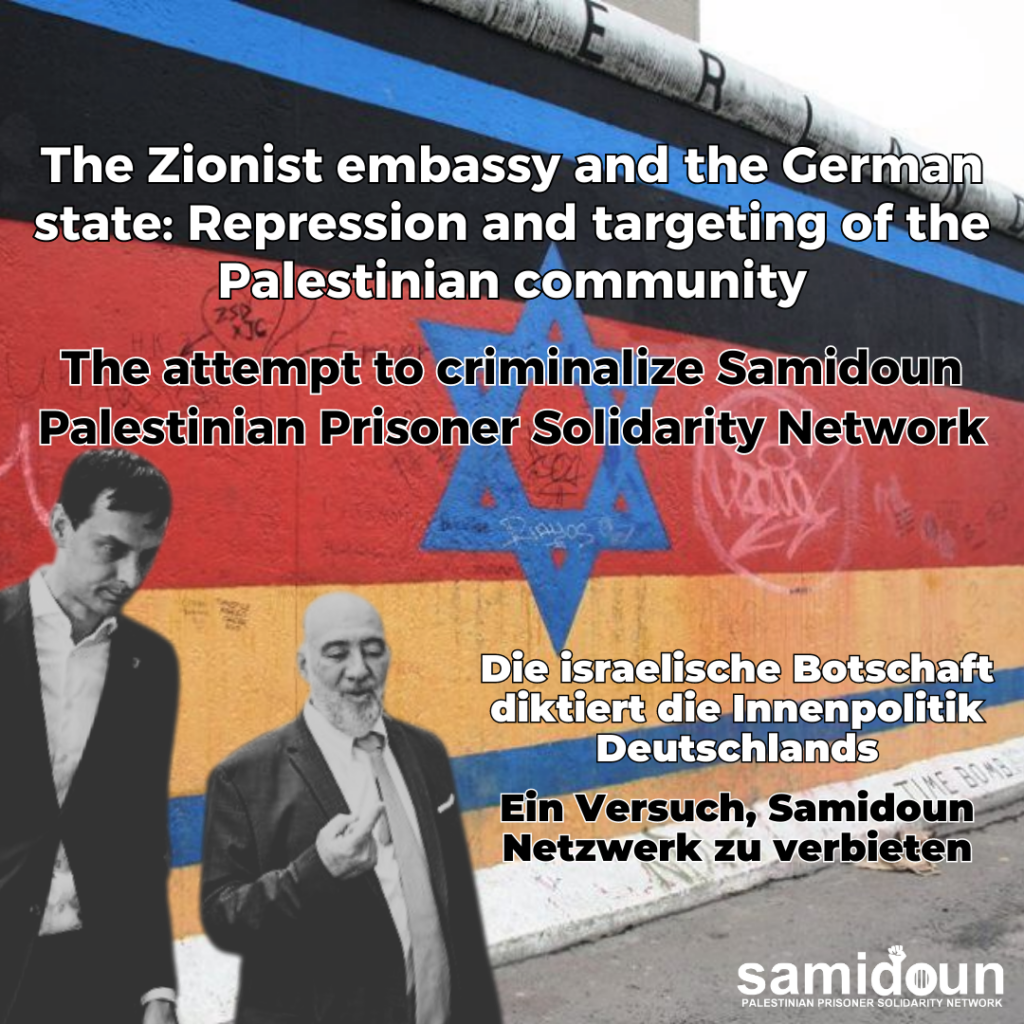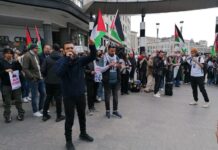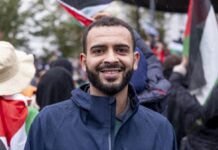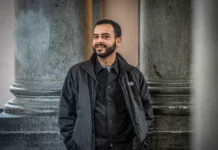
The “German-Israeli Society” announced that it has filed a complaint with the Berlin police against Samidoun Palestinian Prisoner Solidarity Network to classify it as a terrorist organization in Germany and to ban it on the basis of law 129b, which criminalizes organizations and individuals that establish or support so-called “foreign terrorist organizations.”
The Zionists base their allegation on posters in Berlin’s “Arab Street” — Sonnenallee — supporting Palestinian armed resistance against the Zionist project, as well as Samidoun posters saluting the martyrs of Palestine and calling for the liberation of Palestine, and Palestinian flags painted on trees on the street. The Zionist ambassador in Berlin, Ron Prosor, expressed his great anger at the presence of the images of Palestinian prisoners “on the trees” and in the streets of Berlin, which “have become like the streets of Gaza“, as he wrote in an earlier tweet. It is clear that this attack is meant as a broad assault on the Palestinian prisoners’ movement, and that the demand to silence the work of Samidoun is an attempt to silence the voices of Palestinian prisoners at the international level.
These same Zionist organizations — with the full support and involvement of the Zionist embassy in Berlin — used widespread media incitement to provide political cover for the Berlin police and the German state to ban all demonstrations and public protest activities commemorating the Nakba in 2022 and 2023, and Palestinian Prisoners’ Day in 2023.
This cooperation between the Zionist regime, Zionist institutions in Germany, the German corporate media and German politicians, which takes place in clear public view, highlights the relationship between the colonizer in Palestine and its allies in the Western powers. It also reveals, at the same time, the imperialist role of the German state in the colonization of Palestine and the annihilation of the Palestinian people.
The German state has so far adopted — and repeatedly referenced — the so-called “IHRA definition of antisemitism,” the primary function if which is to label anti-Zionism and criticism of the Zionist state, “Israel,” as anti-Semitic. Based on this definition, several recommendations to oppose so-called “Israel-related anti-Semitism” were made at the conference of interior ministers of the 16 German states in November 2022, such as:
- Establishing a legal framework to prosecute supporters of the Palestinian struggle
- Criminalization of slogans such as “Palestine will be free from the River to the Sea” under the pretext that this slogan denies the right of the Zionist occupation to exist, which is considered antisemitic and therefore punishable by law.
- Banning organizations that support Palestine under the pretext of combating “anti-Semitism related to Israel,” among other recommendations.
The conference report cited more than 649 government-funded projects to fight antisemitism, 138 of which are aimed at schools, children and youth. Given the focus on protecting the Zionist project rather than confronting fascism, this is particularly concerning for youth in Germany today, especially Palestinian and Arab youth. We view the attacks on Samidoun as part and parcel of this broad context of repression and political control.
Samidoun is facing a coordinated attack in many locations, involving not only local Zionist organizations but the official involvement of the Zionist embassies in various countries. This includes the attempt to dissolve the Collectif Palestine Vaincra in France, the Geneva city government’s intervention to ban an exhibition of posters by Marc Rudin in Switzerland, the Zionist conference at the European Parliament demanding Samidoun be labelled “terrorist,” repression of organizers challenging Zionist officials in Spain, and assorted media attacks in Belgium, the Netherlands, Sweden, the United States, Canada and elsewhere.
These attacks only highlight the connection between the imperialist Western powers and the colonization of Palestine, and the imperialist dedication to maintaining the Zionist project in occupied Palestine. However, we are certain that all of their attempts to prevent the Palestinian diaspora from organizing and defending their right to resist, to come together, and to liberate their homeland and to support their brave armed resistance will fail.
The demand to ban Samidoun is part and parcel of the ongoing repression by imperialist states targeting Palestinian revolutionary work since the rise of the modern Palestinian revolution in the mid-1960s. The Palestinian revolution represented a great challenge to imperialist interests in the region, as the movement considered the Zionist project as a proxy of Western imperialism and a protector of its interests against the Arab people and Arab countries, resisting it on this basis.
Thirty years after the Oslo Accords in 1993, we can observe today the rebirth of organized Palestinian resistance in Jenin, Nablus, Gaza, and throughout occupied Palestine, and its positive impact on the Palestinian movement in exile. The imperialist states are responding to this new development by an increase in repression and criminalization targeting our movement once again, as they did in the 1970s when the Palestinian revolutionary movement reached its peak and faced a wave of prohibition and persecution.
Furthermore, the Palestinian cause is the central political and historical issue for Arabs, Muslims and anti-imperialist forces. Samidoun, as a political intersection of these forces, poses a great point of concern, especially for the German state. The targeting of Samidoun also shows the German state’s concern about the politicization and involvement of the masses of migrants and refugees in Germany in the anti-imperialist struggle, which is central to Samidoun’s work in Germany. These forms of repression, media smear campaigns and threats to ban organizations are attempts to weaken the anti-imperialist forces and to preserve and strengthen the colonial system.
As Samidoun Palestinian Prisoner Solidarity Network, we once again emphasize our commitment to defend the prisoners in the prisons of Zionist colonialism, to bring their struggles to the public and to communicate their positions, and we will continue to work to build bridges between the Palestinian prisoners’ movement and the liberation movements and revolutionary forces in the world. At a fundamental level, this attack is directed against the Palestinian prisoners as a whole, seeking to criminalize their struggle and undermine their revolutionary role. We emphasize our steadfastness and commitment to stand against state repression and Zionist attacks, and our continued support for the Palestinian resistance and our loyalty to the cause of the martyrs and prisoners: the liberation of Palestine, from the river to the sea, and the return of the Palestinian refugees to their towns and villages.
Long live the Palestinian liberation struggle,
Long live Palestine.
Samidoun Germany
Discover more from Samidoun: Palestinian Prisoner Solidarity Network
Subscribe to get the latest posts sent to your email.




